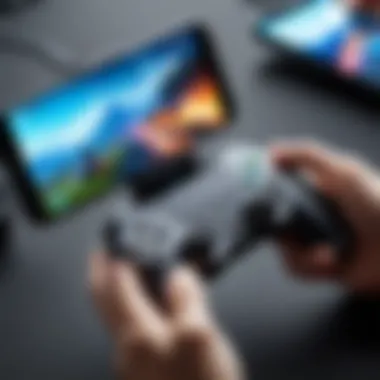Exploring Phone Games Compatible with Controllers


Intro
The mobile gaming landscape has transformed significantly in the last decade. As devices have evolved in power and capability, so too has the complexity of the games that they can run. Among the myriad of advancements are external controllers, which can substantially enhance the user experience by bringing tactile feedback and precision to gameplay. This piece explores how phone games leverage the benefits offered by controllers, the titles that support this functionality, and what to look forward to in terms of future developments.
Many players are discovering that gaming on their smartphones can feel more immersive when combined with hardware designed for such activities. An external controller allows for nuances in control that touch screens may not fully provide. This article highlights these advantages, digs into specific games that support controller integration, and aims to guide users in selecting the most suitable controllers for their gaming preferences.
By analyzing key trends, we aim to engage tech-savvy individuals who are keen on optimizing their mobile gaming experiences. It underscores how the merging of mobile devices with traditional gaming peripherals signals a new phase in gaming. Let's now delve into the broader overview of the products available in this domain.
Foreword to Mobile Gaming with Controllers
The landscape of mobile gaming has evolved tremendously over the past decade. Innovative technology has transformed how games are played, with diverse genres now available at our fingertips. Among these advancements, the use of controllers for mobile gaming is gaining significant traction. This section will explore the importance of integrating controller support to enhance the gaming experience.
Defining Mobile Gaming
Mobile gaming refers to playing games on portable devices such as smartphones and tablets. Unlike traditional gaming consoles, mobile devices provide users with flexibility and convenience. Games can be played anywhere, anytime, making them a popular choice for many users. The range of available games spans various genres, from casual puzzle games to more complex action titles. Moreover, mobile gaming has seen an increase in online connectivity. Players can now engage in multiplayer games, accessing a global pool of competitors. As technology improves, mobile games increasingly attempt to provide experiences similar to those found on gaming consoles.
Importance of Controller Support
Controller support is a crucial element of mobile gaming. It enhances the overall gameplay experience by providing users with better control and comfort.
- Enhanced Precision: Using a controller often allows for more precise input than touch screens. This precision is particularly valuable in fast-paced action games where split-second decisions can impact the outcome.
- Comfort During Long Sessions: Mobile games can be played for extended periods. Controller support improves ergonomics, making it easier for players to engage with games without discomfort.
- Accessibility: Not all players are comfortable or efficient while using a touchscreen. Controller support expands gaming accessibility, allowing a wider audience to engage with mobile games.
"Controller compatibility transforms mobile gaming into a more robust experience, merging the convenience of portability with the precision of traditional gaming."
Mobile gaming with controllers is not just a trend. It represents a shift in how we experience interactive entertainment on our portable devices. The understanding of this facet sets the stage for a comprehensive look into the benefits of using controllers, the popular game titles that support this feature, and the future implications for the gaming community.
Benefits of Using Controllers for Mobile Games
Mobile gaming has grown into a dynamic industry, and the use of controllers is increasingly gaining traction. The benefits of utilizing controllers in mobile games are manifold, spanning from improved gameplay to enhanced ergonomics. Understanding these advantages is crucial for gamers looking to elevate their gaming experience.
Enhanced Gameplay Experience
Using controllers can significantly alter how players engage with mobile games. Unlike touch screens, controllers provide tactile feedback that makes actions more immediate and satisfying. Players often find that the precision offered by analog sticks allows for smoother movement and better timing in action-packed environments.
Furthermore, many modern mobile games are designed with controllers in mind, integrating features that cater to external devices. This can include optimized button mapping, responsive analog controls, and improved sensitivity settings. For example, well-known titles like Call of Duty: Mobile and Fortnite offer robust support for controllers, allowing players to utilize a variety of gameplay strategies that touch controls may not support adequately.
Improved Precision and Control
Precision is a key aspect in gaming success. Controllers provide a level of accuracy that most touch controls struggle to match. Analog sticks enable movements that are more precise compared to swiping and tapping on a screen. This is particularly advantageous in genres like first-person shooters or racing games, where nuanced controls can determine victory or defeat.
When you use a controller, the input lag typically decreases. This leads to quicker responses, enabling players to execute complex maneuvers with ease. For instance, the responsiveness of Asphalt 9: Legends is vastly amplified with a controller, allowing players to navigate tight corners or engage in high-paced races with greater control than ever.
Ergonomics and Comfort


Comfort is another critical factor to consider. Prolonged periods of gaming on mobile devices can lead to discomfort and fatigue due to awkward hand positions. By using a controller, players can adopt a more natural grip. This ergonomic design reduces strain during extended gameplay sessions, allowing for longer and more enjoyable gaming experiences.
Moreover, many controllers come equipped with features such as textured grips and adjustable sensitivity, enhancing overall user satisfaction. Fewer gameplay interruptions due to discomfort lead to a more immersive experience. Players using controllers often express better enjoyment of their gaming sessions, as they can focus on the game rather than physical strain.
In summary, the integration of controllers into mobile gaming provides enhanced gameplay experiences, improved precision, and increased comfort. These benefits are essential considerations for any player looking to fully enjoy mobile games.
Popular Phone Games That Support Controllers
The rise of mobile gaming has been remarkable, transforming how players engage with their favorite titles. As mobile devices become increasingly capable, the integration of external controllers offers a significant improvement in gameplay. Popular phone games that support controllers not only enrich the experience but also cater to a broader audience, including those who prefer traditional gaming setups. Choosing a game that supports controllers can profoundly change how one interacts, enhances performance, and increases enjoyment. Here, we will explore different categories of games that are compatible with controllers, outlining the unique aspects and advantages offered by each.
Action Games
Action games, known for their fast-paced gameplay and reflex-testing challenges, benefit immensely from controller support. Games like "Call of Duty: Mobile" and "Fortnite" allow players to perform complex maneuvers with greater precision. Controllers provide an advantage in quick aiming and shooting, which is essential in competitive settings. Often, the tactile feedback from a controller can lead to more immersive experiences.
Players can expect improved response times and consistent control layouts, which are crucial in high-stakes scenarios. The physicality of a controller also enhances the sensation of involvement, making each action feel more substantial than touch controls.
Racing Games
Racing games have long enjoyed a reputation for needing precise control and quick responses. Popular titles like "Asphalt 9: Legends" and "Mario Kart Tour" highlight this requirement. Using a controller in racing games allows for fine-tuning of steering, accelerating, and braking. These mechanics become more fluid and responsive, leading to an enjoyable and competitive experience.
Moreover, many racing games are designed with controller input in mind. The experience feels more akin to console or PC gaming, as players navigate courses with ease and agility. The inclusion of features such as force feedback also enriches the experience, providing sensory engagement with the apposite on-screen events.
Adventure and RPG Games
Adventure and role-playing games (RPGs), such as "Genshin Impact" and "The Elder Scrolls: Blades," offer expansive worlds and intricate narratives. Utilizing controllers to navigate these elaborate environments aids in delivering a smoother gameplay experience. Actions such as jumping, dodging, and engaging in combat become more intuitive.
For many players, RPGs are not just about story but also the control scheme. With a controller, one can manage skills and inventory items more effectively. Players may find themselves immersed in rich narratives while seamlessly executing complex commands without the frustration often found in touch controls.
Multiplayer Titles
Multiplayer games thrive on responsiveness and teamwork. Titles like "Among Us" or "Brawl Stars" can be played with controllers, allowing players to interact with different elements of the game in a more ergonomic way. The ease of use with a controller can facilitate rapid action and communication, essential for collaborative gameplay.
The social aspect of multiplayer titles often hinges on how quickly players can execute commands. By using a controller, gamers can expect enhanced performance. Also, being able to play with friends who have similar setups creates a unified gaming environment, boosting enjoyment.
In summary, popular phone games that support controllers enhance gameplay through improved precision, responsiveness, and overall enjoyment. Each genre provides unique advantages, inviting players to explore the vast potential of their mobile devices.
Evaluating Controller Options for Mobile Gaming
Selecting the right controller for mobile gaming is crucial for an immersive experience. Not all controllers are made equal, and some may not provide the level of responsiveness or comfort needed for various game genres. It is important to evaluate controller options based on factors like type, compatibility with devices, and user preferences. Understanding these elements can significantly enhance gameplay and overall enjoyment.
Types of Controllers Available
In the market, there are various types of controllers tailored for mobile gaming.
- Gamepads: These are similar to console controllers, offering buttons, triggers, and joysticks. Popular examples include the Xbox Wireless Controller and the PlayStation DualShock 4. Both controllers connect easily to mobile devices and offer extensive functionality.
- Mobile-specific Controllers: Brands like Razer and SteelSeries create controllers specifically designed for mobile gaming. The Razer Kishi is an example that connects directly to your phone, mimicking the console experience.
- Touchscreen Controllers: These controllers do not require a physical connection. They often overlay on the mobile screen and allow touch inputs only. They can be useful for games that do not support hardware controllers.


Choosing the right type involves considering the game genres played frequently. For action games, a gamepad might be preferable for its controls and responsiveness. In contrast, mobile-specific controllers often combine portability and ergonomics.
Compatibility with Different Devices
Not every controller is compatible with all mobile devices. Before purchasing a controller, it is essential to verify its compatibility with your specific smartphone model. Factors to consider include:
- Operating System: Controllers may vary in compatibility with iOS and Android devices. Some controllers excel with one OS but not the other.
- Connection Type: Controllers can connect via wired or wireless methods. Wired controllers may use USB-C or Lightning ports, while wireless controllers typically connect through Bluetooth. Ensure that your device supports the connection type of the controller.
- Game Library Support: Certain controllers provide better support for a wide range of games. Research whether your favorite games are optimized for the controller you plan to use.
When evaluating compatibility, make sure to read user reviews and manufacturer specifications. Connecting a controller that does not work well with your device can lead to frustrating experiences.
"Choosing the right controller can transform your mobile gaming experience. The benefits include improved precision, enhanced control, and increased comfort during long gaming sessions."
In summary, evaluating these factors will guide gamers in selecting a controller that suits their needs. The aim is to elevate the overall gaming experience on mobile devices.
How to Connect Controllers to Mobile Devices
Connecting controllers to mobile devices is a significant topic in mobile gaming. It is essential because it enhances the user's gaming experience, allowing for a more immersive interaction with games. Knowing how to link a controller effectively opens up new possibilities for gameplay, improving precision and comfort. Furthermore, understanding the connection methods can help users make informed choices when setting up their gaming environment.
Wired Connection Methods
Wired connections tend to provide a stable and consistent gaming experience. This method usually involves plugging the controller directly into the mobile device using a USB or USB-C cable. Here are some important points regarding wired connections:
- Reliability: Wired connections are less prone to interference compared to wireless connections. This results in reduced input lag, which is crucial for competitive gaming.
- Immediate Setup: Connecting a controller through a wire does not require any additional configurations. Just plug it in, and most devices will recognize it immediately.
- Power Supply: Some controllers can charge while connected, ensuring longer gaming sessions without the worry of battery life.
When opting for a wired connection, it is important to verify that the mobile device supports USB OTG (On-The-Go) functionality. This feature allows the device to act as a host and enables connection with external devices.
Wireless Connection Techniques
Wireless connections offer more flexibility, allowing users to play without being tethered. There are several techniques available for connecting controllers wirelessly:
- Bluetooth Pairing: Most modern controllers use Bluetooth to connect to mobile devices. Here’s a simple process to pair:
- Dedicated Apps: Some controller manufacturers provide companion apps that facilitate the connection process. These applications may offer additional settings to customize the controller functionalities.
- Future Technologies: As mobile gaming evolves, new wireless technologies may emerge, including low-latency options that can minimize lag further.
- Activate Bluetooth on the mobile device.
- Put the controller in pairing mode, typically by holding a specific button.
- Select the controller from the list of available devices on the mobile device.
- Confirm the connection.
Connecting a controller to a mobile device unlocks new gaming experiences. The right method can be chosen based on the user’s preferences, enhancing both casual and competitive play.
Trends in Mobile Gaming and Controller Technology
The evolution of mobile gaming has significantly impacted controller technology. This section explores the trends that shape this intersection, highlighting the adaptations that developers and technology manufacturers make to cater to a growing demand for enhanced mobile gaming experiences. Adapting controllers to smartphones changes both gaming culture and user expectations. As technology advances, so do the functionalities of mobile games and the means through which they are experienced.
Integration of Advanced Technologies
With the rise of augmented reality (AR) and virtual reality (VR), mobile gaming is no longer confined to traditional formats. The integration of advanced technologies has led to devices that are capable of offering immersive experiences. For instance, apps like "Pokemon GO" not only rely on mobile devices but also on external peripherals like Bluetooth controllers, which enhance gameplay.
Additionally, cloud gaming technology has matured. Services like Google Stadia and NVIDIA GeForce Now provide gamers with the ability to play high-definition games directly on mobile devices, which would have been nearly impossible years ago. These platforms often support external controllers, ensuring that the gameplay remains seamless and responsive. Both AR and cloud gaming represent a shift towards interactivity that was not previously possible with standalone devices.


Future Projections for Mobile Gaming
The future of mobile gaming, particularly concerning controller technology, is poised for significant growth. Recent studies show that mobile gaming will likely surpass console gaming revenues in the coming years. This trajectory calls for a more sophisticated approach to controller design and compatibility.
Developers and manufacturers are focusing on creating universally compatible controllers. This involves designing controllers that seamlessly connect to multiple platforms, reducing the reliance on unique devices. The trend of creating modular controllers, where users can customize their setups, is also on the rise. Game developers are looking into haptic feedback and adaptive triggers to replicate console-like experiences on mobile devices.
"The continuous advancement in mobile technology indicates that our mobile devices will soon match, if not exceed, the capabilities of traditional gaming consoles."
Case Studies: Successful Phone Games with Controllers
The integration of controllers with mobile games has led to a significant evolution in the gaming landscape. Examining case studies of successful phone games that support controllers reveals important insights into the effectiveness of this technology. In this segment, we will analyze how these games utilize controller functionality to enhance playability. Moreover, we will explore user feedback, which further illuminates the benefits such games offer.
Analysis of Leading Titles
Several titles stand out as exemplary cases in the realm of mobile gaming with controllers. Games like Call of Duty: Mobile, Fortnite, and Dead Cells provide players with versatile gameplay experiences. They cater to varied preferences and gaming styles.
- Call of Duty: Mobile allows a rich gaming environment through its elaborate maps and extensive weaponry. The use of a controller allows for improved aiming and quicker reaction times, which are crucial in fast-paced scenarios.
- Fortnite, a popular multiplayer battle royale game, incorporates controller support, enabling players to experience more precise movements. It enhances the competition as players can execute complex strategies more effectively.
- Dead Cells is a rogue-lite action-platformer that benefits from controller input as it requires quick reflexes and precise actions. With a controller, the commands feel more responsive. Players often report that they appreciate having control over their character's movements, making game progression more enjoyable.
"Using a controller with games like Dead Cells transforms the experience. It's not just a matter of play; it's about feeling in command of every action."
These examples illustrate how tailored controller integration can attract and retain gamers while providing a platform for developers to innovate. Each title demonstrates that successful integration not only enhances the quality of gameplay but also drives user satisfaction.
User Experience Testimonials
User experience plays a crucial role in gauging the success of mobile games that support controller use. Feedback from gamers reveals common themes regarding their preferences and challenges.
Many users express their appreciation for the improved gameplay mechanics that controllers can offer. One player stated, "The difference with a controller is night and day. My reaction times have improved, and I am finally able to compete at a higher level."
Comfort is another frequent point of discussion. Players often prefer the ergonomic designs of controllers over touchscreens. For instance, a gamer revealed, "My hands used to cramp after a long gaming session on my phone. With a controller, I can play for hours without discomfort."
However, there are also considerations that arise from user feedback. Some players note that not all games are optimized for controller use, leading to a less than optimal experience. As one user pointed out, "Some titles do not properly recognize the controller, which can be frustrating during critical moments."
Overall, these testimonials underscore the value of controllers in mobile gaming. They provide critical insights that developers can utilize to improve their offerings.
Through these case studies and user experiences, it is evident that the realm of mobile gaming with controllers has substantial potential for growth and innovation.
Epilogue and Final Thoughts
In this article, we explored the evolving landscape of mobile gaming and the integral role that controllers play within it. The use of controllers extends beyond mere convenience; it enhances gameplay experience, improves precision, and allows for better ergonomics. These points are essential for both casual players and serious gamers who want to derive maximum enjoyment from their mobile games.
Recap of Key Points
- Definition of Mobile Gaming: Clarity on what mobile gaming encompasses sets the stage for understanding its growth.
- Benefits of Controllers: Enhanced precision, comfort, and improved experience came through as major advantages of using a controller.
- Popular Games: Various titles across different genres were examined, showing diversity in gameplay that can benefit from controller use.
- Controller Evaluation: Different types and compatibility options help users make informed choices.
- Connection Methods: Instructions on how to connect controllers demonstrate accessibility for users with various devices.
- Trends: Awareness of trends in technology and gaming helps predict how the gaming landscape may change.
- Case Studies: User experiences solidified the benefits discussed, illustrating real-world applications of these concepts.
The Future of Mobile Gaming with Controllers
The future of mobile gaming with controllers appears promising. As technology advances, we can expect controllers to become more sophisticated and integrated with mobile devices. Features such as adaptive triggers, enhanced haptic feedback, and possibly even AI integration could make gameplay even more immersive.
Furthermore, as the gaming community continues to expand, developers are likely to prioritize controller support in their titles. This strategy not only broadens their audience but also enhances user satisfaction.
In sum, the interconnection between mobile gaming and controller technology is a realm ripe with potential. For enthusiasts and casual gamers alike, it’s a journey worth exploring.



